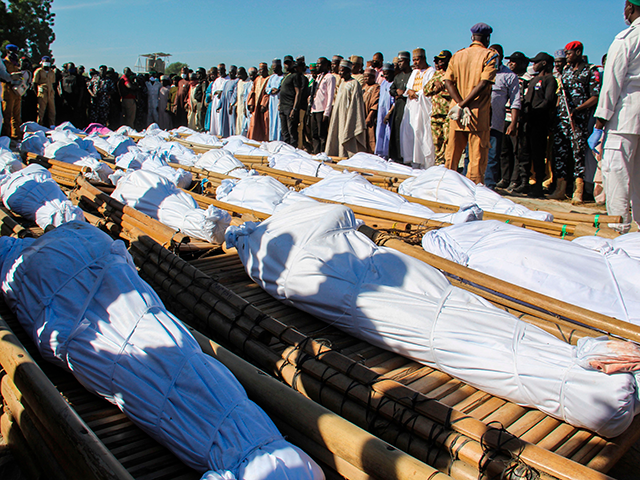An Islamist insurgency carried out by jihadist terror groups across northeastern Nigeria since 2009 killed nearly 350,000 people by the end of 2020, the United Nations (UN) estimated in a new report on the conflict published Wednesday.
“[B]y the end of 2020 armed conflict in north-eastern Nigeria will have directly killed over 35,000 Nigerians. However, for each direct death, an additional nine people (most of them children) will have been killed due to lack of food and resources,” the United Nations Development Programme (UNDP) wrote in a report titled Assessing the Impact of Conflict on Development in Nigeria released June 23.
The UNDP collaborated with Nigeria’s Ministry of Finance to produce the assessment, which used official data and statistics provided by the Nigerian federal government.
“According to national data, conflict has directly resulted in the deaths of 35,000 people in the BAY states [Borno, Adamawa, and Yobe] as a result of battle or one-sided violence since 2009,” according to the report.
“However, the full human cost of war is much greater. Already, many more have died from the indirect effects of the conflict. We estimate that through the end of 2020, the conflict will have resulted in nearly 350,000 deaths, with 314,000 of those from indirect causes,” the United Nations agency wrote.
“We estimate that more than 90 percent of conflict-attributable deaths through 2020, about 324,000, are of children younger than five. With another decade of conflict, that could grow to more than 1.1 million,” the UNDP predicted.
Jihadist attacks in northeastern Nigeria, where the radical Islamic group Boko Haram was founded, has caused a ripple effect of “physical and economic” repercussions that ultimately result in the “indirect” deaths described by the United Nations.
“Insecurity has led to decline in agricultural production and trade, reducing access to food and threatening the many households who depend on agriculture for income [sic],” according to the UNDP report. “Hundreds of thousands of Nigerians have been displaced from their homes, often meaning the loss of livelihoods, assets, and critical support systems.”
“Moreover, displaced populations must often live in overcrowded and degraded living conditions without access to clean water and sanitation. Young children, who are especially vulnerable to malnutrition and disease from a lack of clean water, are hit hardest,” the development program noted.
“Conflict has been especially damaging to education, as schools have been targeted directly by insurgents. In 2020, we estimate that 1.8 million students are out of school who would have been enrolled if not for conflict,” the UNDP wrote.
Boko Haram and the Islamic State West Africa Province (ISWAP) – Boko Haram’s name after pledging allegiance to the Islamic State in 2015, but by now a largely splintered-off organization – have waged war in northeastern Nigeria over the past 12 years. Some members of the post-2015 ISWAP remained loyal to a former Boko Haram leader named Abubakar Shekau, however, sparking an ongoing intra-group conflict. Boko Haram allegedly confirmed to Agence France-Presse on June 16 that Abubakar Shekau killed himself via suicide vest on May 19 after he was cornered by ISWAP fighters in northeastern Nigeria.
They traditionally raid government-run schools, among other targets, as part of their stated goal of eradicating Western culture from the mainly Muslim region, as well as neighboring African countries bordering Lake Chad. The school attacks often involve mass student kidnappings.
Recent reports by local Nigerian media outlets support the UNDP’s assessment of Boko Haram and ISWAP’s detrimental impact on the Nigerian education system.
“The country has witnessed at least 11 cases of kidnapping of pupils and students from their schools since 2014. Over 700 students and pupils have been kidnapped since December 2020,” the Nigerian online newspaper Premium Times reported on June 22.
“The mass kidnapping of students from their schools is becoming a norm in Nigeria, particularly in the northern part of the country,” according to the newspaper.
A recent uptick of terror attacks targeting Nigerian schools has coincided with Boko Haram’s resurgence in Nigeria over the past several months, which has seen the linked jihadist groups expand their reach beyond their traditional northeastern stronghold. Nigerian government officials revealed in March that they had recently been forced to close at least 618 schools across six northern states due to a surge in kidnappings at educational centers. The Nigerian federal government has blamed the rise in terrorism on “bandits” or unidentified “militants,” but observers believe the attacks are linked to Boko Haram, which is known to contract local criminal gangs to help carry out abductions.

COMMENTS
Please let us know if you're having issues with commenting.